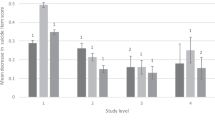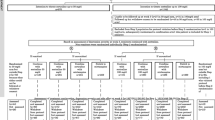Abstract
Rationale
Traditionally, the therapeutic effect of antidepressants is thought to take several weeks. However, several studies found evidence of early drug response occurring within the first 2 weeks of antidepressant treatment and that this early onset response may predict eventual treatment outcome.
Objective
This study aims to investigate the predictive value of early improvement in the course of treatment with imipramine or venlafaxine in an inpatient population with severe major depression.
Method
A post hoc analysis was conducted after pooling data from two almost identical trials. The study included 149 patients with DSM-IV diagnosis major depression and a baseline score ≥17 on the 17-item Hamilton Rating Scale for Depression (HAM-D). Patients were randomized for double-blind treatment with either antidepressant. Early improvement (≥25 % reduction on HAM-D score) was evaluated after 2 weeks and response (≥50 % reduction on HAM-D score) after 6 weeks of acute treatment.
Results
Of 64 patients achieving early improvement, 38 (59 %) became responders, whereas of 85 patients not achieving early improvement, only 23 (27 %) became responders. There was a significant difference in time to response between patients achieving early improvement and patients not achieving early improvement. Early improvement is a modest sensitive predictor for eventual response.
Conclusion
In the present study, although the sensitivity of early improvement was modest, based on the severity of clinical symptoms, a clinician treating a patient with severe major depression may seriously consider changing the treatment at an earlier stage than is presently customary.



Similar content being viewed by others
References
Anderson IM (1998) SSRIS versus tricyclic antidepressants in depressed inpatients: a meta-analysis of efficacy and tolerability. Depress Anxiety 7(Suppl1):11–17
Bagby RM, Ryder AG, Schuller DR, Marshall MB (2004) The Hamilton Depression Rating Scale: has the gold standard become a lead weight? Am J Psychiatry 161:2163–2177
Baldwin DS, Stein DJ, Dolberg OT, Bandelow B (2009) How long should a trial of escitalopram treatment be in patients with major depressive disorder, generalised anxiety disorder or social anxiety disorder? An exploration of the randomised controlled trial database. Hum Psychopharmacol Clin Exp 24:269–275
Bech P (2001) Meta-analysis of placebo-controlled trials with mirtazapine using the core items of the Hamilton Depression Scale as evidence of a pure antidepressive effect in the short-term treatment of major depression. Int J Neuropsychopharmacol 4(4):337–345
Bowden CL, Schatzberg AF, Rosenbaum A, Contreras SA, Samson JA, Dessain E, Sayler M (1993) Fluoxetine and desipramine in major depressive disorder. J Clin Psychopharmacol 13(5):305–311
Brannan SK, Mallinckrodt CH, Detke MJ, Watkin JG, Tollefson GD (2005) Onset of action for duloxetine 60 mg once daily: double-blind, placebo-controlled studies. J Psychiatr Res 39(2):161–172
Entsuah R, Derivan A, Kikta D (1998) Early onset of antidepressant action of venlafaxine: pattern analysis in intent-to-treat patients. Clin Ther 20(3):517–526
First MB, Spitzer RL, Gibbon M, Williams JB (1999) Structured clinical interview for DSM-IV axis I disorders (Dutch translation). Swets & Zeitlinger, Lisse
Hamilton M (1960) A rating scale for depression. J Neurol Neurosurg Psychiatry 23:56–62
Henkel V, Seemuller F, Obermeier M, Adli M, Bauer M, Mundt C, Brieger P, Laux G, Bender W, Heuser I, Zeiler J, Gaebel W, Mayr A, Moller HJ, Riedel M (2009) Does early improvement triggered by antidepressants predict response/remission? Analysis of data from a naturalistic study on a large sample of inpatients with major depression. J Affect Disord 115(3):439–449
Jacobson NS, Truax P (1991) Clinical significance: a statistical approach to defining meaningful change in psychotherapy research. J Consult Clin Psychol 59:12–19
Kaplan EL, Meier P (1958) Nonparametric estimation from incomplete observations. J Am Stat Assoc 53:457–481
Katz MM, Tekell JL, Bowden CL, Brannan S, Houston JP, Berman N, Frazer A (2004) Onset and early behavioral effects of pharmacologically different antidepressants and placebo in depression. Neuropsychopharmacology 29(3):566–579
Khan A, Cohen S, Dager S, Avery DH, Dunner DL (1989) Onset of response in relation to outcome in depressed outpatients with placebo and imipramine. J Affect Disord 17(1):33–38
Khan A, Upton VG, Rudolph RL, Entsuah R, Leventer SM (1998) The use of venlafaxine in the treatment of major depression and major depression associated with anxiety: a dose–response study. Venlafaxine Investigator Study Group. J Clin Psychopharmacol 18(1):19–25
Kleinbaum DG, Klein M (2012) Survival analysis. A self-learning text (3rd edn). Springer, New York
Nagayama H, Nagano K, Ikezaki A, Tashiro T (1991) Prediction of efficacy of antidepressant by 1-week test therapy in depression. J Affect Disord 23(4):213–216
Nierenberg AA (2003) Predictors of response to antidepressants general principles and clinical implications. Psychiatr Clin North Am 26(2):345–352, viii
Nierenberg AA, Farabaugh AH, Alpert JE, Gordon J, Worthington JJ, Rosenbaum JF, Fava M (2000) Timing of onset of antidepressant response with fluoxetine treatment. Am J Psychiatry 157(9):1423–1428
Papakostas GI, Perlis RH, Scalia MJ, Petersen TJ, Fava M (2006) A meta-analysis of early sustained response rates between antidepressants and placebo for the treatment of major depressive disorder. J Clin Psychopharmacol 26(1):56–60
Posternak MA, Zimmerman M (2005) Is there a delay in the antidepressant effect? A meta-analysis. J Clin Psychiatry 66(2):148–158
Quitkin FM, Rabkin JG, Ross D, McGrath PJ (1984a) Duration of antidepressant drug treatment. What is an adequate trial? Arch Gen Psychiatry 41(3):238–245
Quitkin FM, Rabkin JG, Ross D, Stewart JW (1984b) Identification of true drug response to antidepressants. Use of pattern analysis. Arch Gen Psychiatry 41(8):782–786
Quitkin FM, Rabkin JD, Markowitz JM, Stewart JW, McGrath PJ, Harrison W (1987) Use of pattern analysis to identify true drug response. A replication. Arch Gen Psychiatry 44(3):259–264
Quitkin FM, McGrath PJ, Stewart JW, Ocepek-Welikson K, Taylor BP, Nunes E, Deliyannides D, Agosti V, Donovan SJ, Petkova E, Klein DF (1996a) Chronological milestones to guide drug change. When should clinicians switch antidepressants? Arch Gen Psychiatry 53(9):785–792
Quitkin FM, McGrath PJ, Stewart JW, Taylor BP, Klein DF (1996b) Can the effects of antidepressants be observed in the first two weeks of treatment? Neuropsychopharmacology 15(4):390–394
Quitkin FM, Petkova E, McGrath PJ, Taylor B, Beasley C, Stewart J, Amsterdam J, Fava M, Rosenbaum J, Reimherr F, Fawcett J, Chen Y, Klein D (2003) When should a trial of fluoxetine for major depression be declared failed? Am J Psychiatry 160(4):734–740
Small JG, Milstein V, Kellams JJ, Small IF (1981) Comparative onset of improvement in depressive symptomatology with drug treatment, electroconvulsive therapy, and placebo. J Clin Psychopharmacol 1:62S–69S
Spiker DG, Kupfer DJ (1988) Placebo response rates in psychotic and nonpsychotic depression. J Affect Disord 14(1):21–23
Stahl SM, Entsuah R, Rudolph RL (2002) Comparative efficacy between venlafaxine and SSRIs: a pooled analysis of patients with depression. Biol Psychiatry 52(12):1166–1174
Stassen HH, Angst J, Delini-Stula A (1996) Delayed onset of action of antidepressant drugs? Survey of results of Zurich meta-analyses. Pharmacopsychiatry 29(3):87–96
Storosum JG, Elferink AJA, van Zwieten BJ, van den Brink W, Huyser J (2004) Natural course and placebo response in short-term, placebo-controlled studies in major depression: a meta-analysis of published and non-published studies. Pharmacopsychiatry 37(1):32–36
Szegedi A, Muller MJ, Anghelescu I, Klawe C, Kohnen R, Benkert O (2003) Early improvement under mirtazapine and paroxetine predicts later stable response and remission with high sensitivity in patients with major depression. J Clin Psychiatry 64(4):413–420
Szegedi A, Jansen WT, van Willigenburg AP, van der Meulen E, Stassen HH, Thase ME (2009) Early improvement in the first 2 weeks as a predictor of treatment outcome in patients with major depressive disorder: a meta-analysis including 6562 patients. J Clin Psychiatry 70:344–353
Taylor MJ, Freemantle N, Geddes JR, Bhagwagar Z (2006) Early onset of selective serotonin reuptake inhibitor antidepressant action: systematic review and meta-analysis. Arch Gen Psychiatry 63(11):1217–1223
Thase ME, Entsuah AR, Rudolph RL (2001) Remission rates during treatment with venlafaxine or selective serotonin reuptake inhibitors. Br J Psychiatry 178:234–241
Tollefson GD, Holman SL (1994) How long to onset of antidepressant action: a meta-analysis of patients treated with fluoxetine or placebo. Int Clin Psychopharmacol 9(4):245–250
Van Calker D, Zobel I, Dykierek P, Deimel CM, Kech S, Lieb K, Berger M, Schramm E (2009) Time course of response to antidepressants: predictive value of early improvement and effect of additional psychotherapy. J Affect Disord 114(1–3):243–253
Van den Broek WW, Birkenhager TK, Mulder PGH, Bruijn JA, Moleman P (2004) A double-blind randomized study comparing imipramine with fluvoxamine in depressed inpatients. Psychopharmacol (Berl) 175(4):481–486
Vermeiden M, Mulder PG, van den Broek WW, Bruijn JA, Birkenhager TK (2013) A double-blind randomized study comparing plasma level-targeted dose imipramine and high-dose venlafaxine in depressed inpatients. J Psychiatr Res 47(10):1337–1342
Volz HP, Muller H, Sturm Y, Preubler B, Moller HJ (1995) Effect of initial treatment with antidepressants as a predictor of outcome after 8 weeks. Psychiatry Res 58(2):107–115
Acknowledgments
The authors thank the following for their support: Mrs. S. Verploegh for valuable assistance in data collection, A.I. Wierdsma for helping with the statistical analysis, and Laraine Visser-Isles for English language editing.
The data have not been previously presented. The Department of Psychiatry, Erasmus Medical Center Rotterdam, owns the preexisting datasets. All authors have access to all datasets. M. Vermeiden (corresponding author) can provide access to the dataset. This study protocol is registered at http://www.controlled-trials.com (identifier: ISRCTN73221288).
Conflict of interest
Funding for this study was provided by the Department of Psychiatry of the Erasmus Medical Center Rotterdam, The Netherlands. Venlafaxine was provided by Wyeth Pharmaceuticals. T.K.B. and W.W.B. have received grants from Lundbeck BV. T.K.B. has received speakers’ fees from Lundbeck BV and AstraZeneca. M.V., A.M.K., and M.E.V. have no conflict of interest.
Author information
Authors and Affiliations
Corresponding author
Rights and permissions
About this article
Cite this article
Vermeiden, M., Kamperman, A.M., Vulink, M.E. et al. Early improvement as a predictor of eventual antidepressant treatment response in severely depressed inpatients. Psychopharmacology 232, 1347–1356 (2015). https://doi.org/10.1007/s00213-014-3765-1
Received:
Accepted:
Published:
Issue Date:
DOI: https://doi.org/10.1007/s00213-014-3765-1




